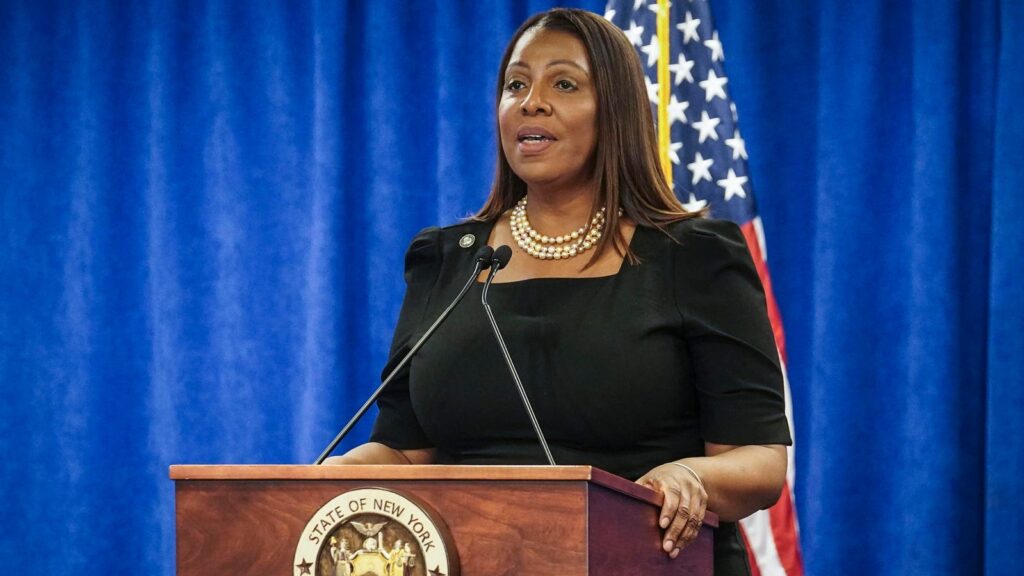New York Attorney General Letitia James announced a lawsuit against Zelle after the Consumer Financial Protection Bureau dropped its own suit against the bank-owned money transfer app.
The Associated Press
Our patchwork system of U.S. state and federal financial regulators is confusing and, at times, redundant. Yet that redundancy means when one regulator is neutered, another can step in. As the Trump administration moves to reduce federal regulations, states (in particular, Democratic-controlled ones) are rushing to fill the gap.
The latest example came earlier this week, when New York Attorney General Letitia James announced a lawsuit against Early Warning Services, the bank-owned company behind popular money transfer app Zelle. The suit alleges that Early Warning let fraud proliferate on Zelle for several years and didn’t do enough to stop it, which cost consumers “hundreds of millions of dollars” in losses. The case was originally brought by the federal Consumer Financial Protection Bureau (CFPB) in December 2024, under President Biden. In March 2025, while the Trump Administration was preparing to dramatically reduce the CFPB’s staff and activity, the agency withdrew its Zelle lawsuit.
In an emailed statement, a Zelle spokesperson called the New York attorney general’s new lawsuit “a copycat of the Consumer Financial Protection Bureau lawsuit that was dismissed in March.” He added that “more than 99.95 percent of all Zelle transactions are completed without any report of scam or fraud.”
Have a story tip? Contact Jeff Kauflin at [email protected] or on Signal at jeff.273.
Kareem Saleh, a former attorney and State Department official who’s now founder and CEO of fair lending startup Fairplay, points out two other examples of states ramping up regulatory actions. They both relate to the concept of disparate impact, when a lender uses a seemingly neutral method of assessing risk that ends up disproportionately excluding or hurting borrowers based on protected characteristics like race, religion, nationality or age. The Supreme Court first recognized the disparate impact theory in 1971.
This past spring, President Trump issued an executive order calling for the elimination of disparate-impact liability and instructing federal agencies to “deprioritize” the enforcement of laws and regulations related to disparate impact. Yet state regulators and courts have continued to make rulings based on disparate impact.
On July 10, San Francisco fintech startup Earnest entered into a regulatory consent order with Massachusetts regarding its student loans. The state alleged that Earnest made unfair, manual adjustments to risk assessments and that its underwriting models created disparate impact in loan approval rates and terms, “with Black and Hispanic applicants more likely to be penalized than White applicants.” Earnest agreed to pay a $2.5 million fine and to develop a “corporate governance system of fair lending testing, internal controls, and risk assessments for the use of Artificial Intelligence Models,” in addition to taking other steps. Earnest denied the allegations and didn’t admit wrongdoing, agreeing to the enforcement action to “avoid the uncertainty of litigation,’’ according to the consent order.
Then on July 28, Maryland’s Supreme Court ruled that an apartment complex owner may have discriminated against a rental applicant, Katrina Hare. The landlord required applicants to earn 2.5 times the cost of monthly rent in income and denied Hare’s application. She argued that the 2.5-times-income threshold should only apply to the amount of rent she was responsible for paying after counting her government-issued housing voucher. The Maryland Supreme Court opinion concluded that more analysis will be needed to decide if the landlord’s minimum-income rule disproportionately (and illegally) hurts voucher holders under the state’s Housing Opportunities Made Equal Act.
Fairplay’s Saleh expects this trend of increased state regulatory activity to continue. “I think these are the first examples of what’s likely to be a widespread initiative by the states over the course of the next several years,” he says.
He also notes there has been a “brain drain” from the CFPB to state regulators. Gabriel O’Malley, who had spent 12 years at the CFPB, most recently as a deputy enforcement director of policy and strategy, left in March to become an executive deputy superintendent at New York’s Department of Financial Services. Atur Desai had been at the CFPB for nearly 10 years and was a deputy chief technologist for law and strategy there before leaving last month, also for a deputy superintendent role at the New York Department of Financial Services, according to his LinkedIn profile.
Read the full article here
